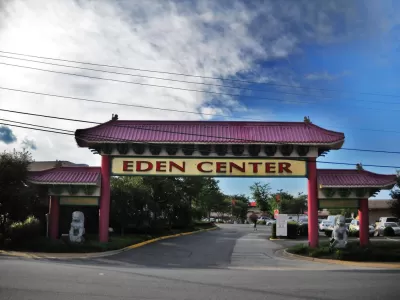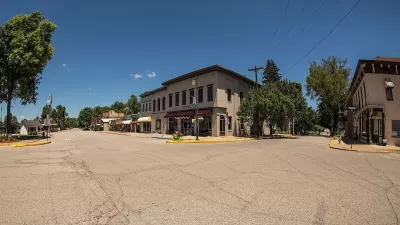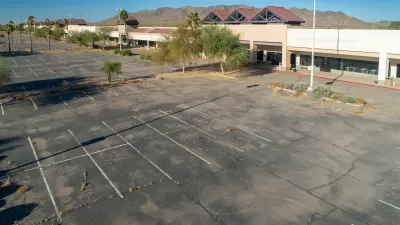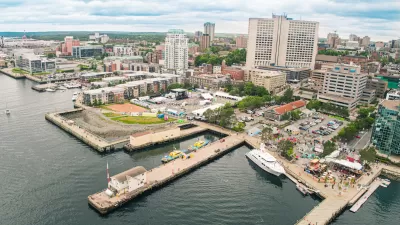One Northern Virginia shopping center illustrates how the auto-centric strip mall can be repurposed to better serve its community.

As the strip mall—that ubiquitous, car-oriented feature of American cities and suburbs—falls out of favor with planners and developers, many of the structures are being demolished and redeveloped. But in a piece on Strong Towns, Addison del Mastro asks, "are there ways for strip malls to be reinvented or reimagined in inexpensive, low-tech, incremental ways?"
According to del Mastro, the answer is "absolutely." del Mastro points to several examples, including a strip plaza in Montgomery County, Maryland where the parking lot fronting a now-vacant discount store informally hosts a variety of small businesses catering to local residents, many of whom do not own cars.
A more formal example, Falls Church's Eden Center, shows how communities can reclaim the physical strip mall form to better serve changing demographics. Located in one of Northern Virginia's most car-oriented areas, Eden Center manages to transform a traditional strip mall into a vibrant, human-oriented space. While the shopping center still requires driving, the small storefronts, lack of vacancies, and inviting public features makes Eden Center an excellent example of how a "substandard form" can still yield an impressive public and commercial space. del Mastro provides photos of the center, showing the small-scale interventions that can improve on an outdated design that will likely remain with us.
FULL STORY: Eden Center: Is This Strip Mall Paradise?

Planetizen Federal Action Tracker
A weekly monitor of how Trump’s orders and actions are impacting planners and planning in America.

Restaurant Patios Were a Pandemic Win — Why Were They so Hard to Keep?
Social distancing requirements and changes in travel patterns prompted cities to pilot new uses for street and sidewalk space. Then it got complicated.

Maui's Vacation Rental Debate Turns Ugly
Verbal attacks, misinformation campaigns and fistfights plague a high-stakes debate to convert thousands of vacation rentals into long-term housing.

In California Battle of Housing vs. Environment, Housing Just Won
A new state law significantly limits the power of CEQA, an environmental review law that served as a powerful tool for blocking new development.

Boulder Eliminates Parking Minimums Citywide
Officials estimate the cost of building a single underground parking space at up to $100,000.

Orange County, Florida Adopts Largest US “Sprawl Repair” Code
The ‘Orange Code’ seeks to rectify decades of sprawl-inducing, car-oriented development.
Urban Design for Planners 1: Software Tools
This six-course series explores essential urban design concepts using open source software and equips planners with the tools they need to participate fully in the urban design process.
Planning for Universal Design
Learn the tools for implementing Universal Design in planning regulations.
Heyer Gruel & Associates PA
JM Goldson LLC
Custer County Colorado
City of Camden Redevelopment Agency
City of Astoria
Transportation Research & Education Center (TREC) at Portland State University
Camden Redevelopment Agency
City of Claremont
Municipality of Princeton (NJ)





























